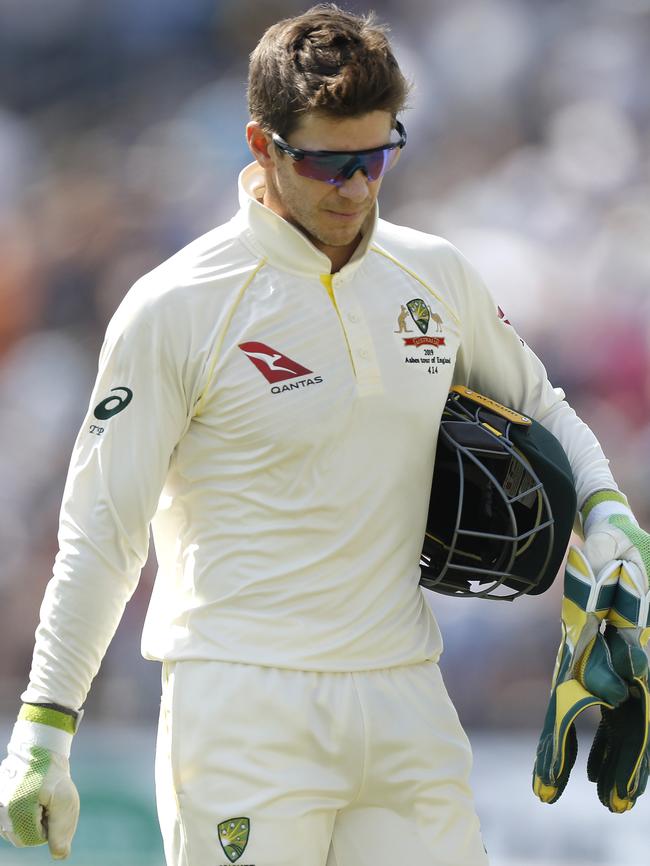Did England win Third Test at Headingley, or did Australia lose it?

If you were present in real time as a cricket-loving onlooker, it was impossible to avoid being swept away by sensations of the former, that a tide had come in the affairs of Ben Stokes, of whose abilities England had been deprived during the preceding Ashes.
Stokes is a fascinating cricketer. Many are now likening him to Ian Botham. The likeness is superficial. Botham was a genuine cavalier, for whom failure was a mere stage on the way to success.
Stokes marks himself hard. Some will recall his astonishing catch of Andile Phehlukwayo during the World Cup. The first response he gave to interviewers afterwards was to plead to the misdemeanour of having come in off the boundary; he said it again; then he said it again.
Stokes has had cause to feel guilty in his career and life: that absence from the last Ashes, and also from the last World Cup but one, were his own doing. Perhaps this underlies his sense of duty and drive for atonement.
Having been part of England’s first day bowling carelessness and second day batting failure, Stokes threw himself into redress. As he carved his name on the game, Joe Root could not prise the ball from his hand, Tim Paine not then budge him from the crease.

Stokes’ epic feat, however, will not satisfy some, especially in Australia, as an explanation. We live in a world that no longer presents only in real time, that offers the scope for study by hindsight (via replay) and slow sight (by slow motion).
Now, we learn, “questions are being asked” about Paine’s leadership — that formulation that suggests the questions ask themselves. Actual interlocutors are unidentified, possible alternatives never canvassed, and the one-wicket margin of defeat scarcely constitutes crisis.
Specific criticisms concern Paine’s scattering of the field as Stokes donned his Iron Man suit in the final chaotic hour and Paine’s impulsive reviewing in the final overs. Add this to Paine’s 34 years of age and relative paucity of runs and you have a perfect storm, albeit in a teacup.
About the former, Paine’s field settings, there can be legitimate disagreement. Yet have you ever seen a captain, in the face of a well-established and powerful batsman licensed to attack by the presence of a last man, get this exactly and obviously right?
Did England win it or Australia lose it? Tubby says, Ben Stokes won it.
— Wide World of Sports (@wwos) August 25, 2019
WATCH: @9Gem
STREAM: https://t.co/ARaHMPPTti#9WWOS #Ashes pic.twitter.com/17rONrgDmz
The critique ignores, furthermore, that Paine’s tactics did generate chances, several of them, which Australia was just not able to take. Paine was assuredly right in this respect: Stokes was resolved to play his shots come what may, regardless of where the field was placed. Should a taller fielder have been on the straight boundary than Marnus Labuschagne? Should a quicker fielder than Marcus Harris have been at third man? These are, surely, counsels of perfection.
What about Paine’s recourse to a review against Jack Leach when the tailender was hit outside the line of leg stump?
It’s hardly the first time a captain has gambled and lost on the DRS. Australians who still kvetch about Stuart Broad standing his ground at Trent Bridge in 2013 tend to forget that Michael Clarke had forfeited Australia’s last review earlier in the afternoon on an LBW shout against Jonny Bairstow by James Pattinson that would hardly have hit another set of stumps.
Captains today are more discriminating about reviews, knowing that one up the sleeve is always handy. But there’s something a bit gratuitous about former captains pronouncing on a system with whose complexities and nuances they never had to deal.
Review burnt! England survive! Eight to win! What a game!
— Wide World of Sports (@wwos) August 25, 2019
WATCH: @9Gem
STREAM: https://t.co/ARaHMPPTti #9WWOS #Ashes pic.twitter.com/l0yYes82vX
Imagine DRS in the age of Shane Warne: he’d have burned both reviews in his first over, then blamed someone else. That’s no criticism by the way: part of Warne’s greatness was his invincible and sincere optimism that everything was out.
Consider this too: the observable reality is that making decisions is hard enough when standing still at the premium vantage point of behind the non-strikers’ stumps with nothing else to think about.
Imagine trying it when on the move while in the act of doing something else, whether batting, bowling, keeping or fielding.
For the forensics of LBWs, the Australians, like other international teams, have a consultative protocol involving square of the wicket fielders advising on height and straight fielders on line, with everyone cocking an ear for the exonerating nick. But this is a million miles removed from our privileged and technologically-advanced vantage point, of which we’d do well to remind ourselves.
WOW! The Aussies didn't have a review left.
— Wide World of Sports (@wwos) August 25, 2019
WATCH: @9Gem
STREAM: https://t.co/ARaHMPPTti#9WWOS #Ashes pic.twitter.com/XLiNgJqNYP
So Stokes was out right, LBW, on 131? The obvious retort is … well, check the scoreboard. Australians, famously, do not ‘walk’, but have traditionally made a point of accepting umpiring decisions.
Nor is it entirely clear that Joel Wilson’s decision was incorrect. Yes, Wilson had a fearful game at Edgbaston. Yes, there was concern at Lord’s when he was third umpire that he might trip over the television cord and pull it out of the wall.

But an off-spinner bowling round the wicket to a sweeping left-hander on a turning pitch needs a heavy burden of evidence to convict, and Ball Tracker’s (misleadingly exact) parabolae are only part of the puzzle. What chance a second spike on Ultra Edge, which we did not see, confirming a graze of the front pad, planted outside leg stump? Stokes says he felt it and has no need to mislead.
Anyway, this is whiny, pettifogging stuff, and it does not flatter Australians to cavil about this or that after such a wonderful, uplifting cricket experience.
There are, it is true, a range of issues associated with Paine’s captaincy, not least the decidedly limited range of potential successors, but they are little changed by events at Headingley. On the contrary, he and the Australians emerged with great credit, for their responsible decision to omit the battered Steve Smith, for their resolve in inimical conditions, and for their grace in defeat. Isn’t that what we wanted from them after Cape Town?



Did England win the Headingley Test? Or did Australia lose it? Discuss. Discuss, in fact, until the mind reels.